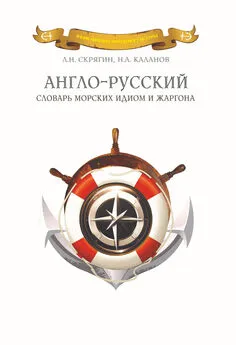Adam Makkai - Словарь американских идиом: 8000 единиц
- Название:Словарь американских идиом: 8000 единиц
- Автор:
- Жанр:
- Издательство:неизвестно
- Год:неизвестен
- ISBN:нет данных
- Рейтинг:
- Избранное:Добавить в избранное
-
Отзывы:
-
Ваша оценка:
Adam Makkai - Словарь американских идиом: 8000 единиц краткое содержание
Это обновленное и дополненное издание, содержащее более 8000 идиоматических
слов и выражений, причем каждое из которых снабжено грамматическим объяснением
и практическим примером. Словарь содержит лексемные идиомы, фразеологические
единицы и поговорки, имеющие особенное значение. В нем приведены наиболее
употребительные выражения только американского английского языка. Этот словарь — идеальное пособие для студентов, часто разъезжающих бизнесменов и просто
путешественников.
Словарь американских идиом: 8000 единиц - читать онлайн бесплатно полную версию (весь текст целиком)
Интервал:
Закладка:
[stand the gaff] {v. phr.} , {informal} To stand rough treatment; do well in spite of great physical or mental hardship. •/ An athlete must learn to stand the gaff. / •/ No person running for office gets far unless he can stand the gaff. / Compare: HOLD OUT 2, STICK OUT 2.
[stand to reason] {v. phr.} To seem very likely from the known facts. •/ If you have a driver’s license, it stands to reason you can drive. / •/ Joe is intelligent and studies hard; it stands to reason that he will pass the examination. /
[stand trial] {v. phr.} To submit to a trial by court. •/ The case has been postponed and he may not have to stand trial until next April. /
[stand up] {v.} 1. To rise to a standing position; get up on your feet. •/ A gentleman stands up when a lady enters a room. / 2. To be strong enough to use hard or for a long time. •/ A rocket must be built strongly to stand up under the blast-off. / •/ The old car has already stood up for twenty years. / Compare: WEAR WELL. 3. {informal} To make a date and then fail to keep it. •/ June cried when Bill stood her up on their first dale. /
[stand up and be counted] {v. phr.} To be willing to say what you think in public; let people know that you are for or against something. •/ The equal rights movement needs people who are willing to stand up and be counted. / •/ If you disagree with the group, you should be ready to stand up and be counted. /
[stand up for]or {informal} [stick up for] {v.} To defend against attack; fight for. •/ John always stands up for his rights. / •/ When Mary was being criticized, Jane stuck up for her. / Compare: BACK UP, GO TO BAT FOR, STAND BY, STAND ONE’S GROUND, STICK TO ONE’S GUNS, GO TO BAT FOR.
[stand up to] {v.} To meet with courage. •/ Mary stood up to the snarling dog that leaped toward her. / •/ A soldier must stand up to danger. /
[stand up with] {v.} , {informal} To be best man or maid of honor at a wedding. •/ A groom often chooses his brother to stand up with him. /
[star]See: FIVE-STAR, SEE STARS, HITCH ONE’S WAGON TO A STAR, LUCKY STAR, THANK ONE’S LUCKY STARS.
[starch]See: TAKE THE STARCH OUT OF.
[stare in the face] {n. phr.} 1. To be about to meet or to happen to (you.) •/ Grandmother became very sick and death was staring her in the face. / •/ Defeat stared them in the face, but the soldiers fought on bravely. / 2. To be easy to see; be plain. •/ Are you looking for your pencil? It’s on your desk, staring you in the face. / •/ Their friends all knew that Mary loved John, but John did not see it even though it was staring him in the face. /
[stars in one’s eyes] {n. phr.} 1. An appearance or feeling of very great happiness or expectation of happiness. •/ Mary gets stars in her eyes when she thinks of her boyfriend. / 2. A belief in the possibility of quick and lasting reforms in people and life and an eagerness to make such changes. •/ Some inexperienced people get stars in their eyes when they think of improving the world. / — [starry-eyed] {adj.} Very happy and excited, perhaps with little reason; eager and self-confident about improving human nature and general conditions of life. •/ Young people are often starry-eyed and eager to improve the world; they do not know how hard it is. /
[start]See: BY FITS AND STARTS, HEAD START, JACK-RABBIT START, RUNNING START.
[start from scratch]See: FROM SCRATCH.
[start in] {v.} , {informal} 1. To begin to do something; start. •/ Fred started in weeding the garden. / •/ The family started in eating supper. / Compare: GO AT. 2. To begin a career. •/ Bob started in as an office boy and became president. / 3. To give a first job to. •/ The bank started him in as a clerk. /
[start out] {v.} 1. To begin to go somewhere. •/ Bill started out for school on his bicycle. / •/ Art started out on a voyage around the world. / Compare: SET OUT. 2. To begin a career or life. •/ Harry started out as an errand boy in a business office. / •/ We all start out in life as helpless infants. / Syn.: START IN. 3. {informal} To give one a first job. •/ The garage man started Pete out as a grease rack man. / Syn.: START IN(3).
[start something] {v. phr.} , {informal} To make trouble; cause a quarrel or fight. •/ John is always starting something. / •/ Jack likes to play tricks on the other boys to start something. / Compare: MAKE SOMETHING OF.
[start the ball rolling]See: GET THE BALL ROLLING.
[start up] {v.} 1. To begin operating, •/ The driver started up the motor of the car. / •/ The engine started up with a roar. / 2. To begin to play (music). •/ The conductor waved his baton, and the band started up. / •/ The orchestra started up a waltz. / Compare: STRIKE UP. 3. To rise or stand suddenly. •/ When he heard the bell, he started up from his chair. /
[stash bag]or [stuff bag] {n.} , {slang} , {informal} 1. A small bag containing marijuana cigarettes or the ingredients for making them. •/ The police are holding John because they found a stash bag full of the stuff on him. / 2. Any small bag resembling a stash bag used for small personal items such as lipstick, driver’s license, etc. •/ Do you have any room for my keys in your stash bag? /
[state]See: LIE IN STATE.
[state-of-the-art] {adj. phr.} The best and — the latest any field of research can offer; modem; the latest; the most advanced. •/ State-of-the-art personal computers may cost a little more than older models, but may be worth the cost for those who need them. / Compare: UP TO DATE.
[status symbol] {v. phr.} Signs of wealth and prestige. •/ A new yacht or airplane might be a status symbol to a bank manager. /
[stead]See: STAND IN GOOD STEAD.
[stave off] {v.} , {literary} To keep from touching or hurting you. Syn.: WARD OFF. •/ The white knight struck with his sword. The black knight staved it off with his own sword. / •/ Bill’s warm new coal staved off the cold. / •/ They staved off starvation by eating two of the sled dogs. /
[stay in] {v. phr.} To remain at home. •/ The weather was so bad that we decided to stay in all day. /
[stay out] {v. phr.} To stay away from home. •/ Her father was very upset because Mary stayed out until 3 A.M. last night. /
[stay put] {v. phr.} To stay in place; not leave. •/ Harry’s father told him to stay put until he came back. / •/ The rocks can be glued to the bulletin board to make them stay put. / •/ After Grandmother came home from her trip to visit Aunt May, she said she wanted to stay put for a while. /
[stay up late] {v. phr.} To not go to bed until very late. •/ Peter has to stay up late these days as he is preparing for his comprehensive exams. / See: BURN THE MIDNIGHT OIL.
[stay with]See: STICK WITH.
[steady]See: GO STEADY.
[steak]See: SALISBURY STEAK, T-BONE STEAK.
[steal]See: LOCK THE BARN DOOR AFTER THE HORSE IS STOLEN.
[steal a march on] {v. phr.} To get ahead of someone by doing a thing unnoticed; get an advantage over. •/ The army stole a march on the enemy by marching at night and attacking them in the morning. / •/ Jack got the job by getting up earlier than Bill. He stole a march on him. / Compare: GET THE JUMP ON, GET THE BETTER OF, TAKE BY SURPRISE.
[steal away]See: SLIP AWAY.
[steal one’s thunder] {v. phr.} To do or say something, intentionally or not, that another person has planned to say or do. •/ Fred intended to nominate Bill for president, but John got up first and stole Fred’s thunder. / •/ Mary was going to sing "Oh! Susanna," but Ellen did it first and Mary said Ellen had stolen her thunder. / •/ Smith heard that Jones was going to offer a new law which people wanted, so he himself proposed the law first, stealing Jones' thunder. /
[steal the show] {v. phr.} To act or do so well in a performance that you get most of the attention and the other performers are unnoticed. •/ Mary was in only one scene of the play, but she stole the show from the stars. /
[steal the spotlight] {v. phr.} To attract attention away from a person or thing that people should be watching. •/ When the maid walked on the stage and tripped over a rug, she stole the spotlight from the leading players. / •/ Just as the speaker began, a little dog ran up the aisle, and stole the spotlight from him. /
[steal up on] {v. phr.} To stealthily approach one; sneak up on someone. •/ The thief stole up on his victim, snatched her purse, and ran away. /
[steam]See: LET OFF STEAM or BLOW OFF STEAM, UNDER ONE’S OWN STEAM.
[steamed up] {adj.} , {informal} Excited or angry about or eager to do something. •/ The coach gave the team a pep talk before the game, and he got them all steamed up to win the game. / •/ When Mary found out that Jane had not kept their secret, she became all steamed up. / •/ Bill was all steamed up about the movie he had just seen. /
[steel]See: MIND LIKE A STEEL TRAP.
[steer clear of] {v.} 1. To steer a safe distance from; go around without touching. •/ A ship steers clear of a rocky shore in stormy weather. / 2. {informal} To stay away from; keep from going near. •/ Fred was angry at Bill, and Bill was steering clear of him. / •/ Some words Martha always spells wrong. She tries to steer clear of them. /
[stem the tide] {v. phr.} To resist; hold back something of great pressure or strength. •/ The way to stem the tide of juvenile delinquency is to strengthen education and to pass a stiff gun control law. /
[step]See: IN STEP, OUT OF STEP, TAKE STEPS.
[step all over]See: WALK OVER.
[step down] {v.} 1. To come down in one move from a higher position to a lower. •/ As soon as the train stopped, the conductor stepped down to help the passengers off. / 2. To make go slower little by little. •/ The train was approaching the station, so the engineer stepped it down. / Compare: SLOW DOWN, STEP UP. 3. To leave a job as an official or some other important position. •/ When the judge became ill, he had to step down. /
Читать дальшеИнтервал:
Закладка:







